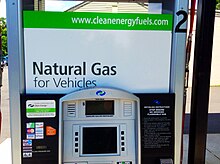
Back تقنية نظيفة Arabic Клийнтех Bulgarian Čista tehnologija BS Cleantech German Tecnología limpia Spanish Cleantech Estonian فناوری پاک Persian Cleantech Finnish Cleantech French Fasaha mai tsabta Hausa


Clean technology, in short cleantech or climatetech, is any process, product, or service that reduces negative environmental impacts through significant energy efficiency improvements, the sustainable use of resources, or environmental protection activities. Clean technology includes a broad range of technology related to recycling, renewable energy, information technology, green transportation, electric motors, green chemistry, lighting, grey water, and more. Environmental finance is a method by which new clean technology projects can obtain financing through the generation of carbon credits. A project that is developed with concern for climate change mitigation is also known as a carbon project.
Clean Edge, a clean technology research firm, describes clean technology "a diverse range of products, services, and processes that harness renewable materials and energy sources, dramatically reduce the use of natural resources, and cut or eliminate emissions and wastes." Clean Edge notes that, "Clean technologies are competitive with, if not superior to, their conventional counterparts. Many also offer significant additional benefits, notably their ability to improve the lives of those in both developed and developing countries."

Investments in clean technology have grown considerably since coming into the spotlight around 2000. According to the United Nations Environment Program, wind, solar, and biofuel companies received a record $148 billion in new funding in 2007 as rising oil prices and climate change policies encouraged investment in renewable energy. $50 billion of that funding went to wind power. Overall, investment in clean-energy and energy-efficiency industries rose 60 percent from 2006 to 2007.[1] In 2009, Clean Edge forecasted that the three main clean technology sectors, solar photovoltaics, wind power, and biofuels, would have revenues of $325.1 billion by 2018.[2]
According to an MIT Energy Initiative Working Paper published in July 2016, about a half of over $25 billion funding provided by venture capital to cleantech from 2006 to 2011 was never recovered. The report cited cleantech's dismal risk/return profiles and the inability of companies developing new materials, chemistries, or processes to achieve manufacturing scale as contributing factors to its flop.[3]
Clean technology has also emerged as an essential topic among businesses and companies. It can reduce pollutants and dirty fuels for every company, regardless of which industry they are in, and using clean technology has become a competitive advantage. Through building their Corporate Social Responsibility (CSR) goals, they participate in using clean technology and other means by promoting Sustainability.[4] Fortune Global 500 firms spend around $20 billion a year on CSR activities in 2018.[5]
- ^ "Archived copy". Bloomberg News. Archived from the original on 2010-05-25. Retrieved 2017-03-06.
{{cite web}}: CS1 maint: archived copy as title (link) - ^ Addison, John (2009-03-11). "Solar, Wind and Biofuels' Impressive Growth Surge in '08". Seeking Alpha. Retrieved 2018-01-03.
- ^ Gaddy, Benjamin; Sivaram, Varun; O’Sullivan, Dr. Francis (2016). "Venture Capital and Cleantech: The Wrong Model for Clean Energy Innovation" (PDF). 77 Massachusetts Ave., Cambridge, MA 02139, USA: MIT Energy Initiative.
{{cite web}}: CS1 maint: location (link) - ^ Ramanan, Ram (2018-07-04). Introduction to Sustainability Analytics (1 ed.). CRC Press. doi:10.1201/9781315154909. ISBN 9781315154909. S2CID 135252457.
- ^ Meier, Stephan; Cassar, Lea (2018-01-31). "Stop Talking About How CSR Helps Your Bottom Line". Harvard Business Review. ISSN 0017-8012.
© MMXXIII Rich X Search. We shall prevail. All rights reserved. Rich X Search